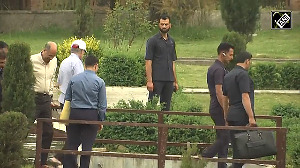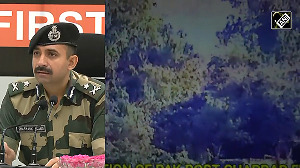Whether the investigation into IPL chief Lalit Modi will finally yield anything is difficult to say, considering the fate of previous investigations (think Tehelka after all the allegations made by government agencies). So, right now, all that the BCCI-IPL officials have to go by is a series of smoking guns, guns which don't point only at Modi.
One of the main allegations is that relatives of Modi own stakes in various franchises and, in all probability, these are benami holdings for him. The problem with this argument is that, according to a special leave petition filed by former BCCI president A C Muthiah in the Supreme Court, BCCI changed its rules to allow office-bearers to own stakes in franchises in 2008.
According to Muthiah, soon after he filed a petition in the Madras High Court against BCCI secretary N Srinivasan owning Chennai Super Kings, the rules were changed to say "no administrator shall have, directly or indirectly, any commercial interest in any of the events of BCCI, excluding IPL, Champions League and Twenty20". So, if Modi has a stake, the rules permit it -- and BCCI allowed this to happen.
Apart from the fact that Srinivasan owns Chennai Super Kings, Agriculture Minister and former BCCI President Sharad Pawar's son-in-law owns a 10 per cent stake in Multi Screen Media, or MSM (formerly Sony) which has the broadcasting rights for IPL. It's true he got these from his father who has owned them long before IPL came into being, but there is a connection of a senior minister and, by that logic, a conflict of interest.
If the government argues that Sony paid a bribe to Modi (MSM has said the $80 million "facilitation fee" it paid to the World Sports Group was part of a contract and was above board), then Pawar's indirect involvement is a fact that has to be dealt with.
The email sent by Aviation Minister Praful Patel to Shashi Tharoor giving financial projections which showed the Kochi team would lose money for the first 10 years also does seem to corroborate the allegation that he was interested in getting the Kochi franchisee to back off -- for the record, Patel has said he sent this to Tharoor as a friend and that the projections were available to everyone.
But this column is not about Modi and the investigation into him, it is about the larger issue of why both Tharoor and Modi are expendable -- while both have made enough enemies because of their behaviour, what's more important is that neither is a political heavyweight.
Look at all the cases against BSP chief Mayawati and, now that the government is afraid it could fall with the Opposition cut motions to its Budget, the Attorney General has told the court that the CBI will consider Mayawati's plea that the disproportionate assets case against her be closed; there was similar evidence bandied around on Lalu Prasad's corruption but while Prasad was important to the government, various income tax authorities gave rulings in his favour.
It is the huge political clout of his party that has ensured, despite it being obvious that Communications Minister A Raja helped a handful of firms which led to the government getting $8-10 billion less of licence fees, no action against him. The CBI is investigating the case, CAG has pretty much nailed the minister with questions that make it clear the firms that got the licences knew when the application windows would open (being first with applications was vital since the early birds got the licences) but the minister remains untouched.
The Delhi airport, similarly, has been riddled with allegations of corruption from even before it was privatised. Initially, it was alleged, and this was found correct by the E Sreedharan committee, that the evaluation process to select the bidder was rigged. After the evaluation report was cancelled, the GMR Group won the bid after promising to share 46 per cent of its top line revenues with the government.
Later, however, the GMR Group tried to redefine what "revenues" were and though this dramatically reduced the government's share in revenues (see business-standard.com/india/news/sunil-jain-mr-20-per-cent/00/16/344585/), the aviation ministry was allowed to go ahead and clear this. Given the NCP's clout in the government, needless to say, no action was taken against anyone.
Given Pramod Mahajan's importance in the BJP/NDA, similarly, no action was taken when he cleared the controversial Universal Access Service Licence that allowed Reliance (at that time undivided), primarily, to legalise its offering of full-blown mobile services on a fixed-line telecom licence.
The number of such instances can be multiplied manifold. The lesson is clear: Political heavyweights are treated very differently from lightweights. You may, like Modi, start off in the good books of heavyweights like Pawar, but when push (in this case, Push-kar) comes to shove, it's not possible to survive. BJD MP Jay Panda had a column the other day in which he said Tharoor was an "arriviste in a hurry", who forgot that to change the rules of politics, you must first know them. The cardinal rule, Jay knows but didn't say in the article, is that you have to keep your political cover (and extra-cover) intact at all times. Right, Jay?






